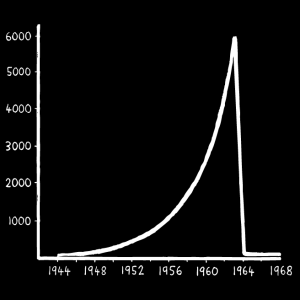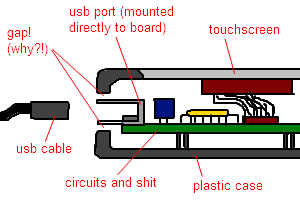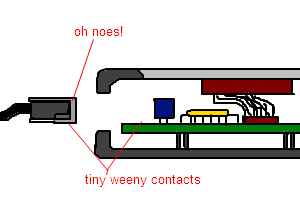[disclaimer: this post appears just days after some friends of mine announce their pregnancy; this is a complete coincidence (this post was written and scheduled some time ago) and of course I’m delighted for the new parents-to-be]
In October, the world population is expected to reach seven billion. Seven fucking billion. I remember being a child and the media reports around the time that we hit five billion: that was in the late 1980s. When my parents were growing up, we hadn’t even hit three billion. For the first nine or ten thousand years of human civilisation between the agricultural revolution and the industrial revolution, the world population was consistently below a billion. Let’s visualise that for a moment:

How big is our island?
Am I the only one who gets really bothered by graphs that look like this? Does it not cause alarm?
We have runaway population growth and finite natural resources. Those two things can’t coexist together forever. Let’s have a look at another graph:

This one is taken from a wonderful comic called St. Matthew Island, about the real island. It charts the population explosion of a herd of reindeer introduced to the island in the 1940s and then left to their own devices in a safe and predator-free environment. Their population ballooned until they were consuming all of their available resources. As it continued to expand, a tipping point was reached, and catastrophe struck: without sufficient food, mass starvation set in and the population crashed down from about 6,000 to only 43. By the 1980s, even these few had died out.
There are now no reindeer on St. Matthew Island. And it looks like this 40-year story could serve as a model for the larger, multi-century, world-wide population explosion that humans are having.
Game Theory
Humans are – in theory at least – smart enough to see what’s coming. If we continue to expand in this way, we risk enormous hardship (likely) and possible extinction (perhaps). Yet still the vast majority of us choose to breed, in spite of the overwhelming evidence that this is Not A Good Thing.
But even people smart enough to know better seem to continue to be procreating. And perhaps they’re right to: for most people, there is – for obvious evolutionary reasons – a biological urge to pass on one’s genes to the next generation. During a period of population explosion, the risk that your genetic material will be “drowned out” by the material of those practically unrelated to you. Sure: there might be a complete ecological collapse in 10, 100 or 1000 years… but the best way to ensure that your genes survive it is to put them into as many individuals as possible: surely some of them will make it, right? Just like buying several lottery tickets improves your chances of hitting the jackpot.

On a political level, too, a similar application of game theory applies: if the other countries are going to have more people, then our country needs more people too! Very few countries penalise families for having multiple children (in fact, to the contrary), and those that do don’t do so very effectively. This leads to a “population arms race”, and no nation can afford to fall behind its rivals: it needs a young workforce ready to pay taxes, produce goods, pay for the upkeep of the retired… and conceive yet more children.
The same tired arguments
Mostly, though, I hear the same tired arguments for breeding [PDF]: cultural conditioning and social expectations, a desire to “pass on” a name (needless to say, I have a different idea about names than many people), a xenophobic belief that the world needs “more people like us” but “less like them”, and worry that you might regret it later (curious how few people seem to consider the reverse of this argument).
For me, the genetic problem is easy enough to fix: if your children’s genes are valuable to you because of their direct relationship (50%) to your genes, then presumably your brother’s (50%) and your niece’s (25%) are valuable to you to: more so than that of somebody on the other side of the world? I just draw the boundary in a different place – all of us humans share well over 99% of our DNA with one another anyway: we’re all one big family! We only share a lower percentage with other primates, a lower percentage still with other mammals, and so on (although we still share quite a lot even with plants).
The similarity between you and your children is only marginally more – almost insignificantly so – than the similarity between you and every other human that has ever lived.
If you’re looking for a “family” that carries your genetic material: you’re living in one… with almost seven billion brothers, sisters, cousins, uncles and aunts! If you can expand your thinking to include the non-human animals, too, well: good for you (I can’t quite stretch that far!). But if you’re looking to help your family survive… can you expand that thinking into a loyalty to your species, instead, and make the effort to reduce population growth for the benefit of all of us?

The other argument I frequently see is the “replacement” argument: that it’s ethically okay for a breeding pair of humans to have exactly two children to “replace” them. This argument has (at least) three flaws:
- The replacement is not instantaneous. If a couple, aged 30, have 2 children, and live to age 80, then there are 50 years during which there are four humans taking up space, food, water and energy. The problem is compounded even further when we factor in the fact that life spans continue to increase. If you live longer than your parents, and your children live longer than you, then “replacement” breeding actually results in a continuous increase in total population.
- Even ignoring the above, “replacement” breeding strategies only actually works if they’re universal. Given that many humans will probably continue to engage super-replacement level reproduction, we’re likely to need a huge number of humans to engage in sub-replacement level or no reproduction in order to balance it out.
- It makes the assumption that current population levels represent a sustainable situation. That might or might not be true – various studies peg the maximum capacity for the planet at anywhere between one and a hundred billion individuals, with the majority concluding a value somewhere between four and ten billion. Given the gravity of the situation, I’d rather err on the side of caution.
Child sandwiches
“Do you not like children, then?” I’m sometimes asked, as if this were the only explanation for my notion. And recently, I’ve found a new analogy to help explain myself: children are like bacon sandwiches.

Children are like bacon sandwiches for five major reasons:
- Like most (but not all) people, I like them.
- I’d love to have them some day.
- But I choose not to, principally because it would be ethically wrong.
- I don’t want to prevent others from having them (although I don’t encourage it either), because their freedom is more important than that they agree with me. However, I’d like everybody to carefully consider their actions.
- They taste best when they’re grilled until they’re just barely-crispy. Mmm.
Now of course I’ve only been refraining from bacon sandwiches for a few months: that’s why this is a new analogy to me… but I’ve felt this way about procreation for as long as I can remember.
The reasons are similar, though: I care about other humans (and, to a much lesser degree, about other living things, especially those which are “closer” family), and I’d rather not be responsible, even a little, for the kind of widespread starvation that was doubtless experienced by the reindeer of St. Matthew Island. Given the way that humans will go to war over limited resources and our capacity to cause destruction and suffering, we might even envy the reindeer – who “only” had to starve to death – before we’re done.
















